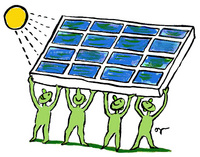German Finance Minister Wolfgang Schäuble has proposed that developing green-energy resources could be a good way for Greece to generate much-needed economic growth. On paper, it sounds like a perfect solution to the country’s dire fiscal problems: Greece, according to Schäuble, could export solar electricity to Germany.
At first glance, monetizing an abundant natural resource (solar energy) to strengthen the national accounts sounds like a straightforward idea, particular given that electricity in central and northern Europe is becoming more scarce and expensive, owing to Germany’s decision earlier this year to phase out nuclear power. But has Schäuble really found a magic bullet to hold down German electricity prices while restoring economic growth to Greece? Yes and no.
Indeed, the bad news: electricity currently produced in photovoltaic installations is far from price competitive with conventional technologies. “Grid parity”– meaning that the cost of electricity produced by a rooftop solar panel is equal to that of electricity from the wall socket – will only be reached in the middle of this decade.
Even then, solar power will still be more expensive than conventionally produced electricity, because “grid parity” excludes transmission and distribution costs, which typically account for about half of the final electricity price. Moreover, even if solar power were competitive, exporting it to Germany would not make economic sense: the required transmission lines do not exist, and the power losses incurred in transporting electricity over long distances is a disincentive to building them.
Even the reduced need for fuel imports (a quarter of Greece’s electricity is produced from oil and gas) would not have a large impact on the Greek current account. After all, because solar panels are unlikely to be produced domestically, they will have to be imported.
The problem, in a nutshell, is that solar-electricity production does not promise high returns. It is very capital-intensive, and only a relatively small number of jobs would be created (for mounting the panels). Even if Greece were able to produce surplus solar electricity, exports would yield little revenue, because standardized technology means that companies and countries can develop almost no productivity advantage. As soon as solar electricity becomes competitive in Greece, other countries with similar levels of irradiation (Spain, Italy, Portugal, Bulgaria, etc.) will enter the market. This will quickly drive electricity prices towards production cost, as solar-generating capacity in Europe approaches electricity demand.
The best way to ensure that German money and the Greek sun support the development of solar-energy technology would be to implement a European “green certificate system.” Under such a system, every European electricity supplier would have to guarantee that a certain share of the electricity that it sells comes from renewable energy sources. Suppliers’ targets could be differentiated, reflecting countries’ varying potential for deploying renewables or developing renewable-technology industries.
To read the complete text on this interesting subject for Reunion Island, I propose the post of the Author George Zachmann.

